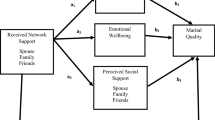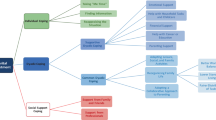Abstract
The aim of the present study was to examine the predictive value of social support and coping for individual and marital adaptation in adult men with autism spectrum disorder (ASD) and their spouses, based on the double ABCX model of adaptation. Twenty-one couples participated in the study and completed measures of stressor severity, social support, coping, individual and marital adaptation. Bivariate analyses showed that each of the model components was related to adaptation in men and women. Hierarchical regression analyses revealed that, after controlling for relevant demographics and stressor severity, informal support was a strong, and unique predictor of adaptation in both spouses (explained variance: 27–89%). Coping did not add to the prediction of adaptation. Clinical implications and limitations are discussed.
Similar content being viewed by others
References
Arrindell, W. A., & Ettema, J. H. M. (1986). SCL-90. Handleiding bij een multidimensionele psychopathologie-indicator. (Manual for a multidimensional indicator of psychopathology). Lisse: Swets & Zeitlinger.
Baron-Cohen, S., Wheelwright, S., Skinner, R., Martin, J., & Clubley, E. (2001). The AQ: Evidence from Asperger syndrome/high-functioning autism, males and females, scientists, and mathematicians. Journal of Autism and Developmental Disorders, 31, 5–17.
Barrera M. J. (1981). Social support in the adjustment of pregnant adolescents: Assessment issues. In B. H. Gottlieb (Ed.), Social networks and social support (pp. 69–96). Beverly Hills CA: Sage.
Barrera, M. J., Sandler, I. N., & Ramsey, T. B. (1981). Preliminary development of a scale of social support: Studies on college students. American Journal of Community Psychology, 9, 435–447.
Bristol, M. M. (1984). Family resources and successful adaptation to autistic children. In E. Schopler, & G. Mesibov (Eds.), The effects of autism on the family (pp. 289–310). New York: Plenum.
Bristol, M. M. (1987). Mothers of children with autism or communication disorders: Successful adaptation and the double ABCX model. Journal of Autism and Developmental Disorders, 17, 469–486.
Bristol, M. M., Gallagher, J. J., & Schopler, E. (1988). Mothers and fathers of young developmentally disabled and nondisabled boys: Adaptation and spousal support. Developmental Psychology, 24, 441–451.
Bromley, J., Hare, D. J., Davison, K., & Emerson, E. (2004). Mothers supporting children with autism spectrum disorders. Social support, mental health status and satisfaction with services. Autism, 8, 409–423.
Bundy, M. B. (1996). The interrelation of stress, appraisal, coping and adjustment in parents of children with autism. Dissertation Abstracts International, 56, 7090.
Cohen, J., Cohen, P., West, S. G., & Aiken, L. S. (2003). Applied multiple regression/correlation analysis for the behavioral sciences. Mahwah: Lawrence Erlbaum Associates.
Cohen, S., & Hoberman, H. (1983). Positive events and social supports as buffers of life change stress. Journal of Applied Social Psychology, 13, 99–125.
Coyne, J. C., & Downey, G. (1991). Social factors and psychopathology: stress, social support, and coping processes. Annual Review of Psychology, 42, 401–425.
Cutrona, C. E. (1996). Social support in couples: marriage as a resource in times of stress. Thousand Oaks CA: Sage.
Cutrona, C. E., & Russell, D. (1987). The provisions of social relationships and adaptation to stress. In W. H. Jones, & D. Perlman (Eds.), Advances in Personal Relationships, Vol. I (pp. 37–67). Greenwich: JAI Press.
Derogatis, L. R. (1977). SCL-90: Administration, scoring and procedures manual-I for the (Revised) Version. Baltimore: Johns Hopkins University School of Medicine, Clinical Psychometrics Research Unit.
Endler, N. S. (1997). Stress, anxiety and coping: The multidimensional interaction model. Canadian Psychology, 38, 136–153.
Engström, I., Ekström, L., & Emilsson, B. (2003). Psychosocial functioning in a group of Swedish adults with Asperger syndrome or high-functioning autism. Autism, 7, 99–110.
Floyd, F. J., & Gallagher, E. M. (1997). Parental stress, care demands, and use of support services for school-age children with disabilities and behavior problems. Family Relations, 46, 359–371.
Folkman, S., & Lazarus, R. S. (1988). Coping as a mediator of emotion. Journal of Personality and Social Psychology, 54, 466–475.
Han, H. R. (2003). Korean mothers’ psychosocial adjustment to their children’s cancer. Journal of Advanced Nursing, 44, 499–506.
Henderson, D., & Vandenberg, B. (1992). Factors influencing adjustment in the families of autistic children. Psychological reports, 71, 167–171.
Herman, S. E., & Thompson, L. (1995). Families perception of their resources for caring for children with developmental disabilities. Mental retardation, 33, 73–83.
Holland, K. D., & Holahan, C.K. (2003). The relation of social support and coping to positive adaptation to breast cancer. Psychology and Health, 18, 15–29.
Honig, A. S., & Winger, C. J. (1997). A professional support program for families of handicapped preschoolers: decrease in maternal stress. The Journal of Primary Prevention, 17, 285–296.
Howlin, P. (2000). Outcome in adult life for more able individuals with autism or Asperger syndrome. Autism, 4, 63–83.
Howlin, P., Goode, S., Hutton, J., & Rutter, M. (2004). Adult outcome for children with autism. Journal of Child Psychology and Psychiatry, 45, 212–229.
Karney, B. R., & Bradbury, T. N. (1995). The longitudinal course of marital quality and stability: A review of theory, method and research. Psychological Bulletin, 118, 3–34.
Kazak, A. E. (1986). Stress in families of children with myelomeningocele. Developmental Medicine and Child Neurology, 28, 220–228.
Keller, D., & Honig, A. S. (2004). Maternal and paternal stress in families with school-aged children with disabilities. American Journal of Orthopsychiatry, 74, 337–348.
Kessler R., & McLeod, J. (1985). Social support and psychological distress in community surveys. In S. Cohen & S. Syme (Eds.), Social support and health (pp. 19–40). New York: Academic Press.
Lavee, Y., McCubbin, H. I., & Patterson, J. M. (1985). The double ABCX model of family stress and adaptation: An empirical test by analysis of structural equations with latent variables. Journal of Marriage and the Family, 47, 811–825.
Lazarus, R. S., & Folkman, S. (1984). Stress, appraisal, and coping. New York: Springer.
Lord C., & Venter, A. (1992). Outcome and follow-up studies of high functioning autistic individuals. In E. Schopler, & G. Mesibov (Eds.), High functioning individuals with autism (pp. 187–200). New York: Plenum Press.
McCubbin, M. A., & McCubbin, H. I. (1993). Family coping with health crisis: the resiliency model of family stress, adjustment and adaptation. In C. Danielson, B. Hamel-Bissell, & P. Winstead-Fry (Eds.), Families, health and illness (pp. 21–63). St. Louis: Mosby.
McCubbin, H. I., & Patterson, J. M. (1983). The family stress process: The double ABCX model of adjustment and adaptation. In H. I. McCubbin, M. B. Sussman, & J. M. Patterson (Eds.), Social stress and the family: Advances and development in family stress theory and research (pp. 7–37). New York: Haworth.
McCrone, P., Leese, M., Thornicroft, G., Schene, A., Knudsen, H., Vázquez-Barquero, J., Lasalvia, A., Padfield, S., White, I., Griffiths, G., & the Epsilon Study Group (2000). Reliability of the camberwell assessment of need—european version—epsilon study 6. The British Journal of Psychiatry, 177, s34–s40.
Ostberg, M., & Hagekull, B. (2000). A structural modeling approach to the understanding of parenting stress. Journal of Clinical Child Psychology, 29, 615–625.
Pakenham, K. I., Samios, C., & Sofronoff, K. (2005). Adjustment in mothers of children with Asperger syndrome: An application of the double ABCX model of family adjustment. Autism, 9, 191–212.
Pasch, L. A., & Bradbury, T. N. (1998). Social support, conflict, and the development of marital dysfunction. Journal of Consulting and Clinical Psychology, 66, 219–230.
Phelan, M., Slade, M., Thornicroft, G., Dunn, D., Holloway, F., Wykes, T., Strathdee, G., Loftus, L., McCrone, P., & Hayward, P. (1995). The Camberwell assessment of need: The validity and reliability of an instrument to assess the needs of people with severe mental illness. British Journal of Psychiatry, 167, 589–595.
Renty, J., & Roeyers, H. (2006). Quality of life in high-functioning adults with autism spectrum disorder: the predictive value of disability and support characteristics. Autism, 10, 511–524.
Russell, D., & Cutrona, C.E. (1991). Social support, stress, and depressive symptoms among the elderly: Test of a process model. Psychology and Aging, 6, 190–201.
Saloviita, T., Italinna, M., & Leinonen, E. (2003). Explaining the parental stress of fathers and mothers caring for a child with intellectual disability: A Double ABCX Model. Journal of Intellectual Disability Research, 47, 300–312.
Spanier, G. B. (1976). Measuring dyadic adjustment: New scales for assessing the quality of marriage and similar dyads. Journal of Marriage and the Family, 38, 15–28.
Tak, Y. R., & McCubbin, M. (2002). Family stress, perceived social support and coping following the diagnosis of a child’s congenital heart disease. Journal of Advanced Nursing, 39, 190–198.
Trivette, C. M., & Dunst, C. J. (1992). Characteristics and influences of role division and social support among mothers of preschool-children with disabilities. Topics in Early Childhood Special Education, 12, 367–385.
Weiss, M. J. (2002). Hardiness and social support as predictors of stress in mothers of typical children, children with autism, and children with mental retardation. Autism, 6, 115–130.
White, N., & Hastings, R. P. (2004). Social and professional support for parents of adolescents with severe intellectual disabilities. Journal of Applied Research in Intellectual Disabilities, 17, 181–190.
Acknowledgments
This study was funded by the Ghent University Research Fund. We gratefully acknowledge the co-operation of all families who participated in this study. Special thanks goes to our graduate students Filip Maes and Ciska Wittouck for their assistance in collecting the data.
Author information
Authors and Affiliations
Corresponding author
Rights and permissions
About this article
Cite this article
Renty, J., Roeyers, H. Individual and Marital Adaptation in Men with Autism Spectrum Disorder and their Spouses: The Role of Social Support and Coping Strategies. J Autism Dev Disord 37, 1247–1255 (2007). https://doi.org/10.1007/s10803-006-0268-x
Published:
Issue Date:
DOI: https://doi.org/10.1007/s10803-006-0268-x




